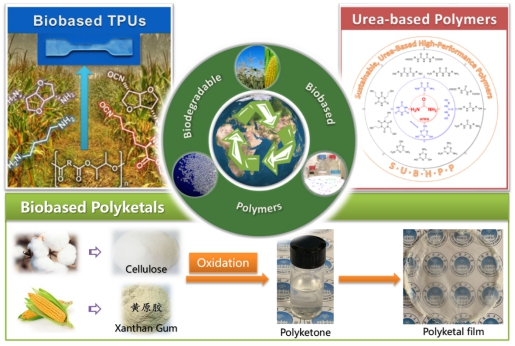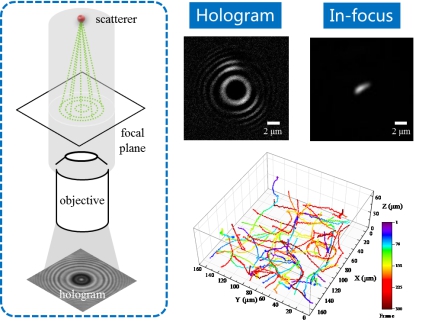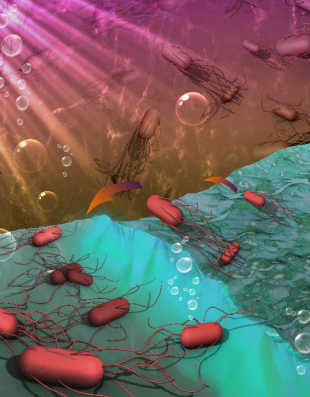Marine Engineering Materials

Overview of the Group
Marine Engineering Materials (MEM) is a reach group founded by Prof. Guangzhao Zhang in South China University of Technology in 2010. Now (2019) the group comprises 4 full professors, 1 associate professor, 3 post-docs, 12 PhD students, and 25 mater students. Grounded on the principles of physical chemistry of polymer solution and interface, the MEM group aims to develop high-performance functional polymeric materials for application in marine and civil engineering. Research of the group covers a broad range of topics including marine antibiofouling materials, chemical grouting materials, anti-corrosion materials, polymer synthesis methodology, physical chemistry of macromolecules andmicroorganism, biorenewable and sustainable polymers, etc.
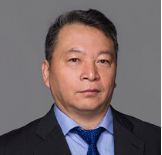
Prof. Guangzhao Zhang received his B.Eng. from Sichuan University (1987) and PhD from Fudan University (1998). He had worked in The Chinese University of Hong Kong (1999–2001) and University of Massachusetts at Amherst (2001–2002) as a postdoctoral fellow. He was appointed to be professor in University of Science and Technology of China in 2002 and worked there until 2010. Currently, he is the Professor of Polymer Science and Engineering in the South China University of Technology.
His research interests cover marine antifouling materials, chemical grouting materials and physical chemistry of macromolecules. He has been awarded Cheung Kong Scholar Chair Professor (2012) and China National Funds for Distinguished Young Scientists (2007). He has served on the editorial advisory boards of Langmuir (2019 to date), Macromolecules (2012-2014), ACS Macro Letters (2012-2014), Macromolecular Chemistry and Physics (2008 to date), Chinese Journal of Polymer Science (2016 to date), Polymer Materials Science and Engineering (2015 to date).

Prof. Junpeng Zhao received his B.S. from University of Science and Technology of China in 2005, and his Ph.D. in 2010 from the same university under the supervision of Prof. Guangzhao Zhang. From 2007 to 2009, he undertook a joint Ph.D. appointment in National Hellenic Research Foundation, Greece, with the supervision of Dr. Stergios Pispas. He was a post-doc fellow at Max-Planck Institute of Colloids and Interfaces from 2011 to 2012 with Prof. Helmut Schlaad and Prof. Markus Antonietti. From the middle of 2012 to the end of 2014, he undertook another post-doctoral appointments at King Abdullah University of Science and Technology with Prof. Nikos Hadjichristidis.
He joined South China University of Technology, Faculty of Materials Science and Engineering, and began his professorship in the beginning of 2015. His main research interest is synthetic polymer chemistry, with special focus on anionic polymerization, organocatalytic/metal-free polymerization, and sustainability of polymer synthesis and materials. He has published more than 50 papers on peer-reviewed journals, including Macromolecules, ACS Macro Letters, Progress in Polymer Science, Angewandte Chemie, etc. He has received grants for 4 research projects from National Natural Science Foundation of China, and given 5 invited lectures in international academic events.
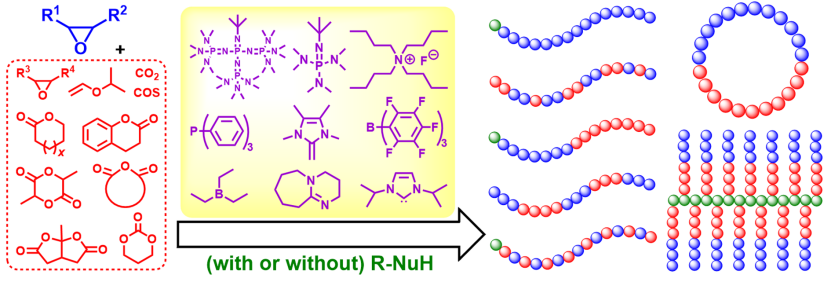

Prof. Chunfeng Ma received his B.S. from Anhui University (2006) and PhD from the University of Science and Technology of China (2011) under the supervision of Prof. Guangzhao Zhang. Then, he joined South China University of Technology (SCUT) to work on antifouling coatings and was promoted to be full professor in 2016. In 2014-2016, he worked as a Hong Kong Scholar (Co-Advisor: Prof. Pei-Yuan Qian) at Coastal Marine Laboratory in The Hong Kong University of Science and Technology. Currently, He is the Professor of Polymer Science and Engineering in the SCUT.
His research focuses on the molecular design and development of polymeric materials and interfaces for marine anti-biofouling. He has published more than 50 papers related to marine anti-biofouling in Biofouling, ACS Appl.Mater. Interfaces, J. Mater. Chem.. He was in charge of several projects form National Nature Science Foundation of China, China Shipbuilding Industry Corporation or industrial customers in the antifouling coatings area.
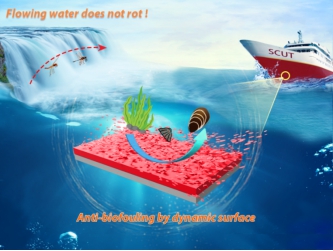
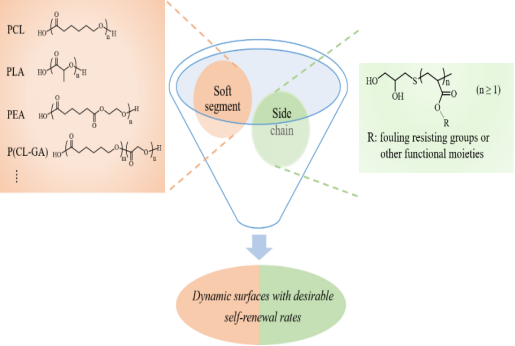
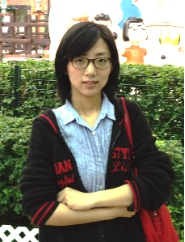
Prof. Xiangjun Gong received her B.S. from Department of Physics, University of Science and Technology of China at 2005, and Ph.D. degree from department of Physics, The Chinese University of Hong Kong at 2011 respectively. After that, she worked as a postdoctoral researcher at Department of Chemistry in The Chinese University of Hong Kong and joined South China University of Technology (SCUT) as associate professor at 2014. She was promoted to be full professor at the current institute in 2017.
Her research interests are focusing on establishment of 3D imaging techniques with high spatial and temporal resolution and using these techniques to study fundamental problems near a surface, e.g., biofouling formation, microbial corrosion, interfacial dynamics and inter-compartmental transfer of environmental contaminants etc.

Dr. Donglin Tang received his B. S. from Beijing Normal University in 2004 and M. S. from Nankai University in 2007. After receiving Ph. D. from the Eindhoven University of Technology in 2011 (supervised by Prof. Cor Koning and Dr. Bart Noordover), he moved to the University of Minnesota for a postdoctoral research with Prof. Chris Macosko and Prof Marc Hillmyer. He currently work as an Associate Professor in the School of Materials Science and Engineering, South China University of Technology
He has been working on biobased polymer materials since 2007. His current research interest is focus on the utilization of renewable urea and natural polysaccharides for exploiting biodegradable polymer materials. The results of his work were published on peer-reviewed journals, including Macromol Rapid Commun, Polym Chem, J Polym Sci Part A Polym Chem, etc. He has received 4 grants from NSFC and other foundations. His teaching courses include Organic Chemistry, Technical English Reading and Writing, Macromolecular Design for undergraduate students and Polymer Synthetic Chemistry, Advanced Polymer Chemistry (in English) for graduate students.
Recent Selected Publications
Liu, S.; Bai, T.; Ni, K.; Chen, Y.; Zhao, J.; Ling, J.; Ye, X.; Zhang, G., Biased Lewis Pairs: A General Catalytic Approach to Ether-Ester Block Copolymers with Unlimited Ordering of Sequences. Angew. Chem. Int. Ed. DOI: 10.1002/anie.201908904. (Liu, S. is a PhD student in our group)
Li, H.; He, G.; Chen, Y.; Zhao, J.; Zhang, G., One-Step Approach to Polyester-Polyether Block Copolymers Using Highly Tunable Bicomponent Catalyst. ACS Macro Lett. 2019, 8, 973. (Li, H. was a PhD student in our group)
Jiang, Z.; Zhao, J.; Zhang, G., Ionic Organocatalyst with a Urea Anion and Tetra-n-butyl Ammonium Cation for Rapid, Selective, and Versatile Ring-Opening Polymerization of Lactide. ACS Macro Lett. 2019, 8, 759. (Jiang, Z. was a master student in our group)
Xie, Q.; Zeng, H.; Ma, C.; Zhang, G. Self-Stratifying Silicone Coating with Nonleaching Antifoulant for Marine Anti-Biofouling. Adv. Mater. Interfaces 2019, 1900535. (Xie, Q. is a Postdoc in our group)
Dai, G.; Xie, Q.; Ma, C.; Zhang, G. Biodegradable Poly(ester-co-acrylate) with Antifoulant Pendant Groups for Marine Anti-Biofouling. ACS Appl. Mater. Interfaces, 2019, 11, 11947. (Dai, G. is a PhD student in our group)
Xie, Q.; Pan, J.; Ma, C.; Zhang, G. Dynamic Surface Antifouling: Mechanism and Systems. Soft Matter, 2019, 15, 1087-1107.
Peng, Q.; Zhou, X.; Wang, Z.; Xie, Q.; Ma, C.; Zhang, G.; Gong, X., Three-Dimensional Bacterial Motions near a Surface Investigated by Digital Holographic Microscopy: Effect of Surface Stiffness, Langmuir 2019, 35, 12257. (Peng, Q. is a master student in our group)
Zhou, X.; Qi, M.; Huang, G.; Ma, C.; Bao, L.; Gong, X.; Zhang, G., Zeng, E. Y., Alternating Electric Fields Induced a Period-dependent Motion of Escherichia coli in Three-dimension near a Conductive Surface, Biointerphases 2019, 14, 011005 (feature article). (Zhou, X. was a master student in our group)
Wang, Z.; Gong, X.; Xie, J.; Liu, G.; Zhang, G., Investigation of Formation of Bacterial Biofilm upon Dead Siblings, Langmuir 2019, 35, 7405. (Wang, Z. was a master student in our group)
Li, H.; Luo, H.; Zhao, J.; Zhang, G., Well-Defined and Structurally Diverse Aromatic Alternating Polyesters Synthesized by Simple Phosphazene Catalysis. Macromolecules 2018, 51, 2247.
Huang, G.; Tian, W.; Qi, M.; Gong, X.; Zhang, G., Improving Axial Resolution for Holographic Tracking of Colloids and Bacteria over a Wide Depth of Field by Optimizing Different Factors, Opt. Express 2018, 26, 9920. (Huang, G. is a PhD student in our group)
Chen, Y.; Shen, J.; Liu, S.; Zhao, J.; Wang, Y.; Zhang, G., High Efficiency Organic Lewis Pair Catalyst for Ring-Opening Polymerization of Epoxides with Chemoselectivity. Macromolecules 2018, 51, 8286. (Chen, Y. is a PhD student in our group)
Hu, S.; Zhao, J.; Zhang, G.; Schlaad, H., Macromolecular Architectures through Organocatalysis. Prog. Polym. Sci. 2017, 74, 34. (Hu, S. was a PhD student in our group)
Zhang, H.; Hu, S.; Zhao, J.; Zhang, G., Phosphazene-Catalyzed Alternating Copolymerization of Dihydrocoumarin and Ethylene Oxide: Weaker Is Better. Macromolecules 2017, 50, 4198. (Zhang, H. is a PhD student in our group)
Liu, C.; Ma, C.; Xie, Q.; Zhang, G. Self-Repairing Silicone Coating for Marine Anti-Biofouling, J. Mater. Chem. A, 2017, 5, 15855. (Liu, C. was a PhD student in our group)
Ma, C.; Zhang, G.; Method for Preparing Main Chain Scission-Type Polysilyl (Meth)acrylate Resin and Application Thereof. US Patent, 2017, US 9701794 B2.
Qi, M.; Gong, X.; Wu, B.; Zhang, G., Landing Dynamics of Swimming Bacteria on a Polymeric Surface: Effect of Surface Properties, Langmuir 2017, 33, 3525. (Qi, M. is a PhD student in our group)
Qi, M.; Song, Q.; Zhao, J.; Ma, C.; Zhang, G.; Gong, X., Three-Dimensional Bacterial Behavior Near Dynamic Surfaces Formed by Degradable Polymers, Langmuir 2017, 33, 13098.
Xia, Y.; Chen, Y.; Song, Q.; Hu, S.; Zhao, J.; Zhang, G., Base-to-Base Organocatalytic Approach for One-Pot Construction of Poly(ethylene oxide)-Based Macromolecular Structures. Macromolecules 2016, 49, 6817. (Xia, Y. was a master student in our group)
Hu, S.; Zhao, J.; Zhang, G., Noncopolymerization Approach to Copolymers via Concurrent Transesterification and Ring-Opening Reactions. ACS Macro Lett. 2016, 5, 40.
Courses We Teach
For Undergraduates: Physical Chemistry, Organic Chemistry, Polymer Physics, Macromolecular Design
For Graduates: Synthetic Polymer Chemistry, Polymer Physical Chemistry, Advanced Polymer Chemistry (in English), Advanced Polymer Physics (in English)
Connections
We have close contacts, communications, and collaborations with researchers in universities and institutes all over the world, including US, Canada, Russia, Germany, France, Australia, Greece, Slovenia, Hong Kong, etc, as well as the top ones in China mainland, including Chinese Academy of Sciences, Peking University, University of Science and Technology of China, Sichuan University, Fudan University, etc.
In the last 5 years, we have sent 8 students abroad to the research groups of our international collaborators as either joint or full PhD students, by means of CSC or other governmental oversea study scholarships.
Facilities and Instruments
Laboratories and facilities for polymer synthesis, characterization, and properties studies. Instruments include Atom Force Microscopy, Quartz Crystal Microbalance, Surface Plasma Resonance, Size Exclusion Chromatography (× 2), Glovebox, in situ FTIR, Digital Holograph Microscopy, Epifluoresence Microscopy. We also have easy access to NMR, Differential Scanning Calorimetry, Matrix-Assisted Laser Desorption/Ionization Time of Flight Mass Spectrometry, Transmission Electron Microscope, Scanning Electron Microscope, X-Ray Diffraction, etc, in the university.
What We Expect from Our Students
Basic knowledge and experimental skills of physical/organic/polymer chemistry, active and creative minds, reliability and trustworthiness, diligence, persistence, and a positive attitude
C3H3: Clear Head, Cleaver Hand, Clean Habit
